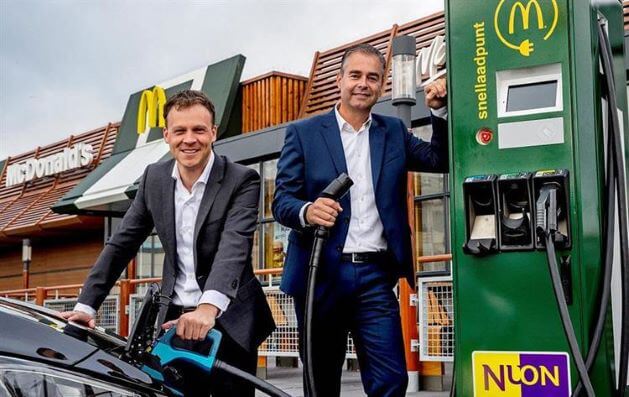

By 2021, every McD in Netherlands will have EV charger. source: Vattenfall
In the Netherlands, the famous fast-food brand, Mc Donalds, has entered into a partnership with operator Nuon, a subsidiary of the energy company Vattenfall . Over the next three years, both the players will install a total of 168 fast charging stations. Specifically, each restaurant with a drive-in will be equipped.
According to the agreement, Nuon – a subsidiary of European utility giant Vattenfall – will install two fast-charging stations at all McDrive locations, in line with the fast food company’s objective to make all its restaurants more “sustainable.”
Due to start, at the end of 2018, the collaboration will allow EV drivers to charge their vehicles in as little as half an hour – enough time, the fast-food company hopes, to serve a large burger. There are already over 20,000 electric cars on Dutch roads.
Electric charging stations are only as green as the source of the energy they use, but in this case, it is completely green. The wind energy produced by Dutch windmills are to be used as the source.


Bas Klaassen, Netherlands’ Director of Development, Real Estate & Construction at McDonald’s, says the move will allow their customers unprecedented convenience.
“We are extremely pleased that with this collaboration we are able to offer our electrically driven guests the convenience of a fast-charging and good facilities of our restaurants. Electric riders can get back on the road within half an hour and have the time for a good cup of coffee,” he said in a statement.
Likewise, Nuon recognises the boost that the agreement will give not only to the 10-year-old electric infrastructure company, but also to the people of Netherlands as a whole.


“Nuon and Vattenfall want to make fossil-free living possible, at home, at work and on the road. That is why we have been active in electric transport for almost 10 years, both public, at home and at companies,” says Pieter van Ommeren, Nuon’s Director Emobility.
“The fact that we can now combine our expertise with the scale of McDonald’s gives the development of electric transport in the Netherlands a huge boost.
“Because to enable all Dutch people to drive electrically, a good infrastructure with sufficient and easily accessible charging points is essential.” he says.
McDonalds and Nuon say the deployment was driven by the strong growth of the zero-emission vehicle market in the country. As of 1 st January this year, the Dutch fleet of electric cars stood at 22,000 units , a figure which showed a rise of 60% year on year.
In 2014, Mc Donald’s took a similar initiative in France. But since then, the French subsidiary, DBT CEV, has not undertaken the deployment of a nationwide infrastructure, leaving it up to the franchisees to put in place possible solutions for their customers. On a positive side of things, France has shown keen interest in electric plug in vehicles. For the first six months of 2018, total registrations amounted to some 25,173 (14,955 passenger BEVs, 3,679 light delivery vans and 6,495 passenger plug-in hybrids), which gives hopes for 50,000 for the year.
1. The mandate for blending Compressed Biogas (CBG) with natural gas has come into effect…
Andhra Pradesh is striving towards greening its energy sector with quite some speed. In a…
With an objective to bolster India’s green energy goals, a Tripartite Agreement has been signed…
The Union MNRE Minister Pralhad Joshi launched the Green Hydrogen Certification Scheme of India (GHCI)…
India’s energy conglomerate Bharat Petroleum Corporation Limited (BPCL) has commissioned a 5MW green hydrogen plant…
In a historical development, the European Space Agency (ESA) has successfully launched its pioneering ‘Biomass’…